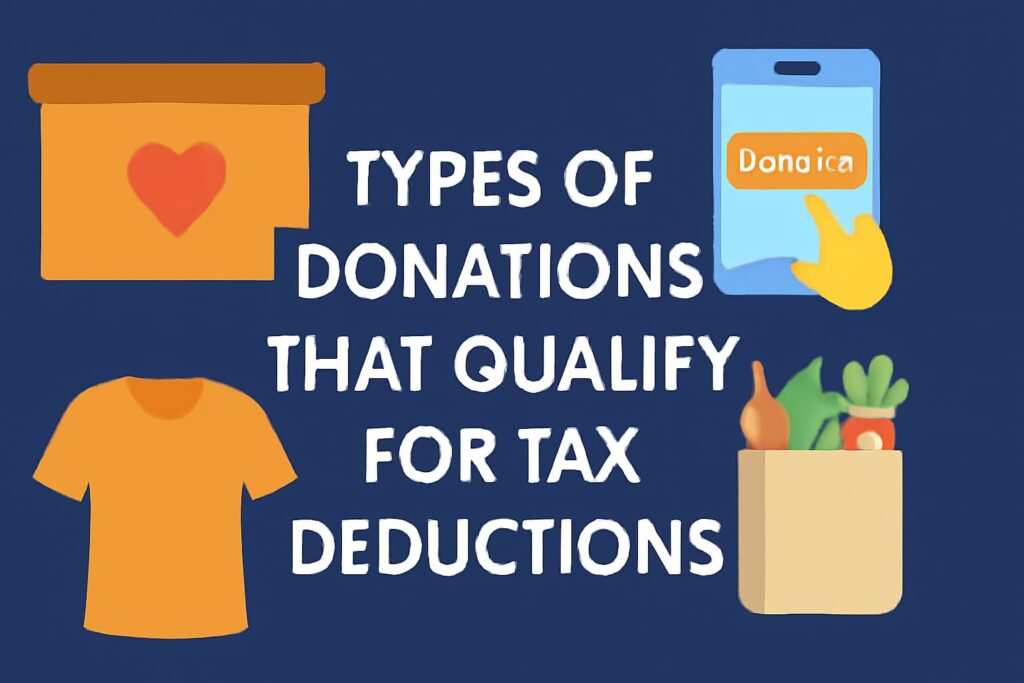Charitable giving is not only a generous act that helps those in need but also offers various tax benefits for the donor. Many people are unaware of the significant tax advantages that come with charitable donations, which can help reduce their overall tax liability. If you’re considering contributing to a cause that matters to you, understanding how your donations can positively impact your taxes is crucial. In this blog, we will explore how donating to charity can help you save money and the specific tax deductions and credits available.
How Charity Donations Affect Your Taxes
When you donate to a recognized charity, your gift is generally considered a tax-deductible contribution. This means that the amount you donate can be subtracted from your taxable income, which lowers your overall tax liability. The IRS (Internal Revenue Service) allows you to deduct contributions made to qualified charitable organizations, but there are specific rules and regulations you need to follow to ensure that your donations are eligible for tax deductions.
Charitable Contributions and Income Taxes
One of the most important tax benefits of donating to charity is the ability to deduct your contributions from your gross income. When you itemize deductions on your tax return, the total amount you donate to charity can reduce your taxable income, meaning you pay taxes on a lower amount. This can potentially lead to a lower tax bracket, which reduces the percentage of your income subject to taxes.
For example, if you make $50,000 in income and donate $5,000 to a qualified charity, your taxable income could be reduced to $45,000, lowering the amount of income that is taxed.
The Standard Deduction vs. Itemized Deductions
While many taxpayers opt for the standard deduction, which is a fixed amount you can deduct from your taxable income without needing to itemize, those who donate large sums to charity might benefit more from itemizing their deductions. By doing so, they can include their charitable donations as part of their itemized deductions.
However, keep in mind that the Tax Cuts and Jobs Act (TCJA) has raised the standard deduction for most taxpayers, meaning fewer people may itemize. This can make it harder to benefit from charitable giving unless you are contributing large amounts. Still, even under these circumstances, there are ways to make your charitable contributions more impactful from a tax perspective.
Types of Donations That Qualify for Tax Deductions
Donating to charity isn’t limited to cash contributions. There are a variety of gifts that can be considered for tax deductions:
- Cash Donations: These are the most straightforward and commonly deducted donations. You simply give money, and the amount is deductible as long as it’s donated to a qualified organization.
- Non-Cash Donations: Donating goods like clothing, furniture, or vehicles can also offer tax benefits. The fair market value of these items can be deducted, but it’s important to keep accurate records and receive a receipt from the charity for your donation.
- Stocks and Bonds: Donating appreciated assets, such as stocks or bonds, can also offer significant tax advantages. When you donate appreciated securities, you avoid paying capital gains taxes on the increased value of the asset. Additionally, the value of the asset is deductible at its fair market value.
- IRA Charitable Rollovers: For individuals 70½ years old and older, the IRA charitable rollover allows you to donate up to $100,000 directly from your IRA to a charity without counting the withdrawal as taxable income.

Limits on Deductions
While charitable donations can be very beneficial, there are limits on how much you can deduct based on your income. Generally, you can deduct donations of up to 60% of your adjusted gross income (AGI) in a given year. However, this percentage can be lower for certain types of donations, such as donations of property or donations to private foundations. It’s important to be aware of these limits to avoid any complications when filing your taxes.
Keep Records of Your Donations
To take full advantage of the tax benefits of charitable donations, it’s essential to keep detailed records of all your contributions. The IRS requires that you have proof of your donations, such as receipts, bank statements, or canceled checks. If you donate goods, you’ll also need to keep a list of the items and their estimated fair market value.
Read Also: How to Donate Anonymously Online: A Step-by-Step GuideConclusion
Donating to charity not only makes a meaningful impact on society but also provides valuable tax benefits for the donor. By understanding the deductions, limits, and types of donations that qualify, you can maximize the tax savings from your charitable contributions. Whether you’re donating cash, goods, or appreciated assets, charitable giving can lower your taxable income and potentially reduce your tax liability. Always keep detailed records of your donations to ensure you can take full advantage of these tax benefits.
FAQ’s: Exploring the Tax Benefits of Donating to Charity
Can I deduct donations made to any charity?
You can only deduct donations made to qualified charitable organizations. The IRS provides a tool called the Exempt Organizations Select Check to help verify if an organization is eligible.
What is the standard deduction, and does it affect my charitable deductions?
The standard deduction is a fixed amount that reduces your taxable income without the need to itemize. If you choose the standard deduction, you can’t deduct charitable contributions unless you meet specific criteria or itemize your deductions.
Are there limits on how much I can deduct for charitable donations?
Yes, there are limits. Generally, you can deduct donations of up to 60% of your adjusted gross income (AGI), though lower limits may apply depending on the type of donation.
Can I donate appreciated assets, such as stocks or real estate, for a tax benefit?
Yes, donating appreciated assets can provide tax advantages by allowing you to avoid paying capital gains taxes on the increased value of the asset.
Do I need to keep records of my donations?
Yes, the IRS requires you to keep detailed records of all donations, including receipts, canceled checks, and bank statements, especially for non-cash donations.





